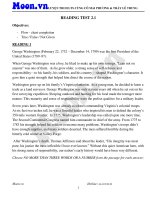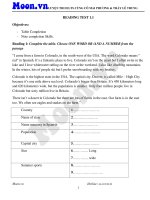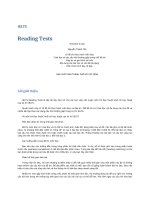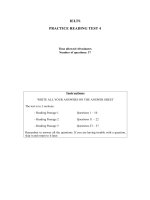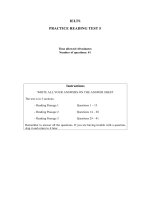IELTS READING TEST BAND
Bạn đang xem bản rút gọn của tài liệu. Xem và tải ngay bản đầy đủ của tài liệu tại đây (65.07 KB, 13 trang )
Reading Passage 1
You should spend about 20 minutes on Questions 1 -13. which are based on
Reading Passage 1 below.
Questions 1-5
IELTS Academic Reading Practice Test 77 With Answers
Reading Passage 1 has five sections, A-E.
Choose the correct heading for each section from the list of headings below.
Write the correct number i-viii in boxes 1-5 on your answer sheet.
1. Section A
2. Section B
3. Section C
4. Section D
5. Section E
1.
2.
3.
4.
5.
6.
7.
8.
Financial costs
Decline and disuse
Birth and development
Political uses of Nushu
The social role of Nushu
Last of the Nushu speakers
Characteristics of written Nushu
Revival and contemporary interest
Nushu
— A Secret Language —
A.
It is sometimes said that men and women communicate in different languages. For
hundreds of years in the Jiangyong county of Hunan Province, China, this was quite
literally the case. Sometime between 400 and 1,000 years ago, women defied the
patriarchal norms of the time that forbade them to read or write and conceived of Nu
Shu — literally, ‘ women’s language ’ — a secretive script and language of their own.
Through building informal networks of ‘sworn sisters’ who committed themselves to
teach the language only to other women, and by using it artistically in ways that
could be passed off as artwork (such as writing characters on a decorative fan),
Nushu was able to grow and spread without attracting too much suspicion.
B.
Nushu has many orthographical distinctions from the standard Chinese script. While
the standard Chinese has large, bold strokes that look as if they might have been
shaped with a thick permanent marker pen, Nushu characters are thin, slanted, and
have a slightly ‘scratchy’ appearance that bears more similarity to calligraphy.
Whereas standard Chinese is logographic, with characters representing words and
meanings, Nushu is entirely phonetic — each character represents a sound; the
meaning must be acquired from the context of what is being said. Users of Nushu
developed coded meanings for various words and phrases, but, likely, only a tiny
fraction of these will ever be known. Many secrets of Nushu have gone to the grave.
C.
Nushu was developed as a way to allow women to communicate with one another in
confidence. To some extent, this demand came from a desire for privacy, and Nushu
allowed women a forum for personal written communication in a society that was
dominated by a male-orientated social culture. There was also a practical element to
the rise of Nushu, however: until the mid 20th century, women were rarely
encouraged to become literate in the standard Chinese script. Nushu provided a
practical and easy-to-learn alternative. Women who were separated from their
families and friends by marriage could, therefore, send ‘letters’ to each other. Unlike
traditional correspondence, however, Nushu characters were painted or embroidered
onto everyday items like fans, pillowcases, and handkerchiefs and embodied in
‘artwork’ to avoid making men suspicious.
D.
After the Chinese Revolution, more women were encouraged to become literate in
the standard Chinese script, and much of the need for a special form of women’s
communication was dampened. When the Red Guard discovered the script in the
1960s, they thought it to be a code used for espionage. Upon learning that it was a
secret women’s language, they were suspicious and fearful. Numerous letters,
weavings, embroideries, and other artefacts were destroyed, and women were
forbidden to practise Nushu customs. As a consequence, the generational chains of
linguistic transmission were broken up, and the language ceased being passed down
through sworn sisters. There is no longer anyone alive who has learnt Nushu in this
traditional manner; Yang Huanyi, the last proficient user of the language, died on
September 20, 2004, in her late 90s.
E.
In recent years, however, popular and scholarly interest in Nushu has blossomed.
The Ford Foundation granted US$209,000 to build a Nu Shu Museum that houses
artefacts such as audio recordings, manuscripts, and articles, some of which date
back over 100 years. The investment from Hong Kong SAR is also being used to
build infrastructure at potential tourist sites in Hunan, and some schools in the area
have begun instruction in the language. Incidentally, the use of Nushu is also a
theme in Lisa See’s historical novel. Snow Flower and the Secret Fan, which has
since been adapted for film.
Questions 6 and 7
IELTS Academic Reading Practice Test 77 With Answers
Choose TWO letters, A-E. Write your answers in boxes 6 and 7 on your answer
sheet.
Why was there a need for Nushu? Which TWO reasons are given in the text?
A. It provided new artistic opportunities for female artisans.
B. It was a way for uneducated women to read and write.
C. Not enough women were taking an interest in literature.
D. It was a way for women to correspond without men knowing.
E. It helped women believe in themselves and their abilities.
Questions 8-13
IELTS Academic Reading Practice Test 77 With Answers
Do the following statements agree with the information given in Reading
Passage 1?
In boxes 8-13 on your answer sheet, write
TRUE, if the statement agrees with the information
FALSE, if the statement contradicts with the information
NOT GIVEN, if there is no information on this
8. The post-Revolution government did not want women to read or write in any
language.
9. At first, the Red Guard thought Nushu might be a tool for spies.
10. Women could be punished with the death penalty for using Nushu.
11. The customary way of learning Nu Shu has died out
12. There is a lot of money to be made out of public interest in Nushu.
13. Nushu is now being openly taught.
Reading Passage 2
You should spend about 20 minutes on Questions 14-26, which are based on
Reading Passage 2 below.
Vitamins
To supplement or not?
A.
Mineral, vitamin, and antioxidant health supplements make up a multi-billion-dollar
industry in the United States alone, but do they really work? Evidence suggests
supplementation is clearly indicated in special circumstances, but can actually be
harmful in others. For the general population, however, supplements have negligible
or no impact on the prevention of common cancers, cardiovascular diseases,
cognitive decline, mortality, or any other major indicators of health. In pursuit of a
longer, happier and healthier life, there are certainly better investments for most
people than a tube of vitamin supplements.
B.
Particular sub-groups of the population can gain a proven benefit from
supplementation. Folic acid has long been indicated as a prenatal supplement due to
its assistance in fetal cell division and corresponding ability to prevent neural tube
birth defects. Since Canada and the United States decided to require white flour to
be fortified with folic acid, spinal birth defects have plummeted by 75%, and rates of
neuroblastoma (a ravaging form of infant cancer) are now 50% lower.
In countries without such fortification, or for women on low-carbohydrate diets, a
prenatal multivitamin could make the crucial difference. The United States
Department of Health and Human Services has concluded that the elderly may also
benefit from extra vitamin D calcium can help prevent bone fractures, and zinc and
antioxidants can maintain vision while deflecting macular degeneration in people
who would otherwise be likely to develop this affliction.
C.
There is mounting evidence, however, for many people to steer clear of
multivitamins. The National Institutes of Health has noted “disturbing evidence of
risk” in tobacco users: beta-carotene, a common ingredient in multivitamins, was
found over a six-year study to significantly contribute to higher lung cancer and
mortality rates in smokers. Meanwhile, excessive vitamin A (a supplement often
taken to boost the immune system) has been proven to increase women’s risk of a
hip fracture, and vitamin E, thought to improve cardiovascular health, was
contraindicated in a study that demonstrated higher rates of congestive heart failure
among such vitamin users.
Antioxidant supplementation has no purpose nor does it achieve anything, according
to the Food and Nutrition Board of the National Academy of Sciences, and the
Medical Letter Group has gone further in suggesting they may interfere with
treatment and promote some cancers. Antioxidants are generally regarded as
counteracting the destructive effect of free radicals in the body, but according to the
Medical Letter’s theory, free radicals may also serve the purpose of sending a
powerful signal to the body’s immune system to fix the damage. By taking
supplements, we risk undermining that message and upsetting the balance of
antioxidants and free radicals in the body. The supplements counteract the free
radicals, the immune system is not placed on alert, and the disease could sneak
through the gates.
D.
One problem with supplementation by the tablet is the poor record on digestibility.
These tablets are often stocked with metal-based minerals that are essentially
miniature rocks, and our bodies are unable to digest them. Even the vitamin
elements of these pills that are theoretically digestible are often unable to be
effectively extracted by our bodies when they arrive in such a condensed form.
In Salt Lake City, for example, over 150 gallons of vitamin and mineral pills are
retrieved from the sewer filters each month. According to the physician’s desk
reference, only about 10% – 20% of multivitamins are absorbed by the body. The
National Advisory Board is even more damning, suggesting that every 100mg of
tablet corresponds to about 8.3mg of blood concentration, although noting that this
can still potentially perform a helpful role in some cases. In effect, for every $100 you
spend on vitamin supplements, over $90 of that is quite literally flushed down the
toilet.
E.
A final argument against multivitamins is the notion that they can lead people –
consciously or not – to the conclusion that supplementation fills in the gaps of an
unhealthy diet and mops up afterwards, leaving their bodies none the wiser that
instead of preparing a breakfast of fresh fruit and muesli, they popped a tiny capsule
with coffee and a chocolate bar.
In a seven-year study, however, the Heart Protection study did not find any positive
outcome whatsoever from multivitamins and concluded that while vitamins in the diet
are important, multivitamin tablets are safe but completely useless. There is evidently
no shortcut around the task of buying, preparing, and consuming fresh fruit and
vegetables every day. Boosting, supplementing, and fortifying products alter people’s
very perception of what healthy food is; instead of heading for the fresh produce
aisle in the supermarket, they are likely to seek out sugary, processed foods with a
handful of extra B vitamins as a healthy choice. We cannot supplement our way out
of a bad diet.
Questions 14-16
IELTS Academic Reading Practice Test 77 With Answers
Choose, the correct letter, A. B, C, or D.
Write the correct letters in boxes 14-16 on your answer sheet.
14. The writer does not recommend multivitamin supplementation for
……………………
A. pregnant women.
B. young children.
C. anyone prone to eye problems.
D. old people.
15. According to the writer, vitamin E has been shown to ………………….
A. lead to heart problems.
B. be good for heart health.
C. support the immune system.
D. have no effect.
16. The Medical letter Group believes antioxidant supplementation
……………………..
A. is ineffective in attacking free radicals.
B. alerts the immune system to the presence of free radicals.
C. attacks both free radicals and the immune system.
D. prevents the immune system from responding to free radicals.
Questions 17-21
IELTS Academic Reading Practice Test 77 With Answers
Do the following statements agree with the information given in Reading Passage 2?
In boxes 17-21 on your answer sheet, write
YES, if the statement agrees with the views of the writer
NO, if the statement contradicts with the views of the writer
NOT GIVEN, if it is impossible to say what the writer thinks about this
1. Some multivitamin tablets have indigestible ingredients.
2. Some individual vitamins are better absorbed than others in a tablet
form.
3. Our bodies cannot distinguish food-based from supplement-based
vitamins.
4. Multivitamins can lead to poorer overall eating habits in a person’s
life.
5. People typically know that fortified processed foods are not good for
them.
Questions 22-26
IELTS Academic Reading Practice Test 77 With Answers
Write the correct letter A, B or C, in boxes 22-26 on your answer sheet.
Classify the following groups of people according to whether they believe.
A. the supplementation may have a positive effect
B. the supplementation may have a negative effect
C. supplementation has no effect
1.
2.
3.
4.
5.
The United States Department of Health and Human Services
The National Institutes of Health
The Food and Nutrition Board of the National Academy of Sciences
The National Advisory Board
The Heart Protection Group
Reading Passage 3
You should spend about 20 minutes on Questions 27-40, which are based on
Reading Passage 3 below.
The Birth of Suburbia
A.
There is no single pivotal moment that could be separated out from any other as the
conception of the suburban lifestyle; from the early 1800s, various types of suburban
development have sprung up and evolved in their own localised ways, from the
streetcar suburbs of New York to the dormitory towns outside of London. It is William
Levitt, however, who is generally regarded as the father of modem suburbia.
During World War II, Levitt served in the United States Navy where he developed
expertise in the mass construction of military housing, a process that he streamlined
using uniform and interchangeable parts. In 1947, the budding developer used this
utilitarian knowledge to begin work with his father and architect brother constructing
a planned community on Long Island, New York. With an emphasis on speed,
efficiency, and cost-effective production, the Levitts were soon able to produce over
30 units a day.
B.
William Levitt correctly predicted the demand for affordable, private, quiet, and
comfortable homes from returning GIS after World War II and with the baby boom
starting to kick in. All the original lots sold out in a matter of days, and by 1951,
nearly 18,000 homes in the area had been constructed by the Levitt fit Sons
Company. Levit town quickly became the prototype of mass-produced housing,
spurring the construction of similar projects in Pennsylvania, New Jersey, and even
Puerto Rico, followed by a new industry, and soon a new way of life and a new ideal
for the American family.
C.
One of the major criticisms of suburbia is that it can lead to isolation and social
dislocation. With properties spread out over great swathes of land, sealed off from
one another by bushes, fences and trees, the emphasis of suburban life is placed
squarely on privacy rather than community. In the densely populated urban
settlements that predated suburbs (and that are still the predominant way of life for
some people), activities such as childcare and household chores as well as sources
of emotional and moral support were widely socialised.
This insured that any one family would be able to draw on a pool of social resources
from their neighbours, building cohabitants and family on nearby streets. Suburbia
breaks these networks down into individual and nuclear family units resulting in an
increase in anti-social behaviour even amongst the wealthy. Teens from wealthy
suburban families, for example, are more likely to smoke, drink alcohol, and use
drugs than their poorer urban peers, and are also more likely to experience
depression and anxiety.
D.
Another major problem with the suburban lifestyle is its damaging ecological impact.
The comparison of leafy, quiet, and low-density suburbs with life in the concrete
towers of sooty, congested urban conurbations is actually quite misleading; as it
turns out if you want to be kind to the natural environment, the key is to stay away
from it. Suburbia fails the environmental friendliness test on a number of counts.
Firstly, due to their low population density, suburbs consume natural land at a much
higher rate than high-density row housing or apartment buildings. Secondly, they
encourage the use of personal motor vehicles, often at a rate of one per family
member, at the expense of public transport. It is also much less efficient to provide
electricity and water to individual suburban houses instead of individual units in an
apartment building.
In his comparison of urban and suburban pollution, Edward L. Glaeser concluded
that we need to “build more sky towers – especially in California”. Virtually
everywhere, he found cities to be cleaner than suburbs. And the difference in carbon
dioxide emissions between high-density cities and their suburbs (for example, in
New York) was the highest. Urban residents of New York can claim on average to
produce nearly 15,000 pounds of carbon dioxide less than their suburban peers.
E.
Another negative aspect of suburban life is its stifling conformity and monotony of
social experience. It was not just the nuts and bolts and the concrete foundations of
suburban houses that got replicated street upon street, block upon block, and suburb
upon suburb; it was everything from the shops and cultural life to people’s hopes,
dreams, and aspirations. Suburbia gave birth to the “strip mall”, a retail
establishment that is typically composed of a collection of national or global chain
stores, all stocked with a centrally dictated, homogenous array of products.
The isolation and lack of interaction in suburbs have also encouraged the popularity
of television, a passively receptive medium for the viewer that, in the early days at
least, offered an extremely limited scope of cultural exposure compared with the
wealth of experiences available in the inner city. Meanwhile, much of the inner-city
“public sphere” has been lost with the suburban flight. The public sphere is the area
of social life in which people come together to freely discuss and identify social
problems. In the city, this has traditionally occurred around newsstands, in coffee
houses, salons, theatres, meeting halls, and so on. Suburbia has not found a way to
replace this special type of social experience, however. Social meeting points in the
suburbs tend to be based exclusively around specific interests such as sports or
cultural clubs, with no broad forms of daily social interaction.
F.
These points do not suggest the idea of suburbia itself is flawed, but that it has not
been executed in a way that takes into account the full spectrum of human needs
and desires. This likely reflects the hasty, thrown-together nature of early suburban
development. With the baby boom rippling across Western countries and demand for
family-friendly housing skyrocketing, developers and city planners were unable to
develop sophisticated models.
Now, however, we should take time to consider what has gone wrong and how we
can reconfigure the suburb. How can we imbue suburban life with the lost sphere of
public discussion and debate? *How can people maintain their after privacy without
sacrificing a sense of community?How can we use new technologies to make
suburbs environmentally friendly? These are questions for which the developers of
tomorrow will have to find answers, lest the dream of suburbia become the
nightmare of Disturbia.
Questions 27-31
IELTS Academic Reading Practice Test 77 With Answers
Reading Passage 3 has six paragraphs, A-F.
Which paragraph contains the following information?
Write the correct letter, A-F, in boxes 27-31 on your answer sheet.
27. A reason to construct taller buildings
28. Where people might discuss issues of societal concern in urban locations
29. The founder of what is broadly understood as contemporary ‘suburbs’
30. Examples of problems suffered by the youth that suburban lifestyle can make
worse
31. A model for suburban development in the latter half of the 20th century
Questions 32-38
IELTS Academic Reading Practice Test 77 With Answers
Do the following statements agree with the information given in Reading Passage 3?
In boxes 32-38 on your answer sheet, write
YES, if the statement agrees with the views of the writer
NO, if the statement contradicts with the views of the writer
NOT GIVEN, if it is impossible to say what the writer thinks about this
32. A good principle for ecological preservation is to avoid human interference.
33. In some countries, the suburbs are more environmentally friendly than in the
USA.
34. Suburban development fosters the use of both public and private forms of
transport
35. People cannot relate to each other in the suburbs because their lives are too
different.
36. There is not much variety amongst the goods at a strip mall.
37. Television has not tended to offer the same diversity as urban cultural outlets.
38. There are no ways for people to get together and interact in the suburbs.
Questions 39 and 40
IELTS Academic Reading Practice Test 77 With Answers
Choose TWO letters, A-E.
Write your answers in boxes 39 and 40 on your answer sheet.
Which TWO of the following does the author conclude?
A. The very concept of a healthy suburban lifestyle is problematic.
B. The speed of suburban growth has contributed to its imperfections.
C. By thinking about human and ecological needs, suburbs can become better
places to live.
D. Developers will have to think about ways of living that do not require suburbs.
E. Suburbs have their downsides, but they are the best way for parents to raise
children.
